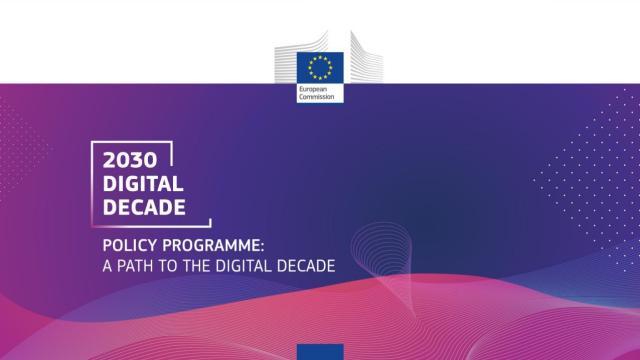Europe's Digital Decade: A vision for digital transformation of Europe by 2030

The European Commission has set out a new vision and strategic plans for achieving a digitally-transfomed Europed by 2030. This transition will simultaneously be a move towards creating a more climate neutral, circular and resilient economy. The ambition of the EU is to develop a Europe that is empowered to pursue a sustainable and prosperous digital future, ensuring that Europe can be digitally sovereign in what is becoming an increasingly open and inter-connected world.
These targets follow on from President von der Leyen's call for making the next period Europe's 'Digital Decade'. It also seeks to respond to the European Council's call for a ‘Digital Compass', and builds on the Commission's digital strategy from February 2020. An agreed set of digital principles has been the proposal from the Commission, to be launched in multiple countries, implementing projects and a solid framework in order to monitor progress; this is to become the Digital Compass. The Compass sets out a joint governance structure with Member States, based on a monitoring system to comprise annual reporting in the form of traffic lights. These targets will be solidified in a Policy Programme to be agreed with the European Parliament and the Council.
The Digital Compass highlights the ambitions set out for achieving by 2030 into four clear, key points:
- Digitally skilled citizens and highly skilled digital professionals: By 2030, at least 80% of all adults should have basic digital skills.
- Secure, performant and sustainable digital infrastructures: By 2030, all EU households should have gigabit connectivity and all populated areas should be covered by 5G.
- Digital transformation of businesses: By 2030, three out of four companies should use cloud computing services, big data and Artificial Intelligence. More than 90% SMEs should reach at least basic level of digital intensity.
- Digitalisation of public services: By 2030, all key public services should be available online; all citizens will have access to their e-medical records, and 80% citizens should use an eID solution.
The mutli-country projects aim to resolve gaps in essential capacities in the EU, with the Commission enabling this by combining investments from the EU budget, Member States and industry, building on the Recovery and Resilience Facility and other EU funding. In the Recovery and Resilience Plans, Member States are committed to offer at least 20% to digital. Potential projects are a pan-European interconnected data processing infrastructure, the design and deployment of the next generation of low power trusted processors, and connected public administrations.
Digital rights for all Europeans are the central focus of the EU's plan for digital progression. A human-centric approach is key for reflecting the real world, so the Commission has proposed that the development of a set of digital principles should take place, ensuring citizens feel they have access to high conenctivity, and non-discriminatory online services, for example. These can be enshrined in an agreement between the official bodies, and monitered annually to see whether Europeans feel their digital rights are respected.
Developing a digital Europe is also essential for international interaction. Combining EU internal investments with the funding available under the new external cooperation instruments will allow the EU to work with partners around the world in achieving common global objectives. Indeed, the Commission has proposed to set up a new EU-US Trade and Technology Council.
© Jacob Lund - stock.adobe.com




